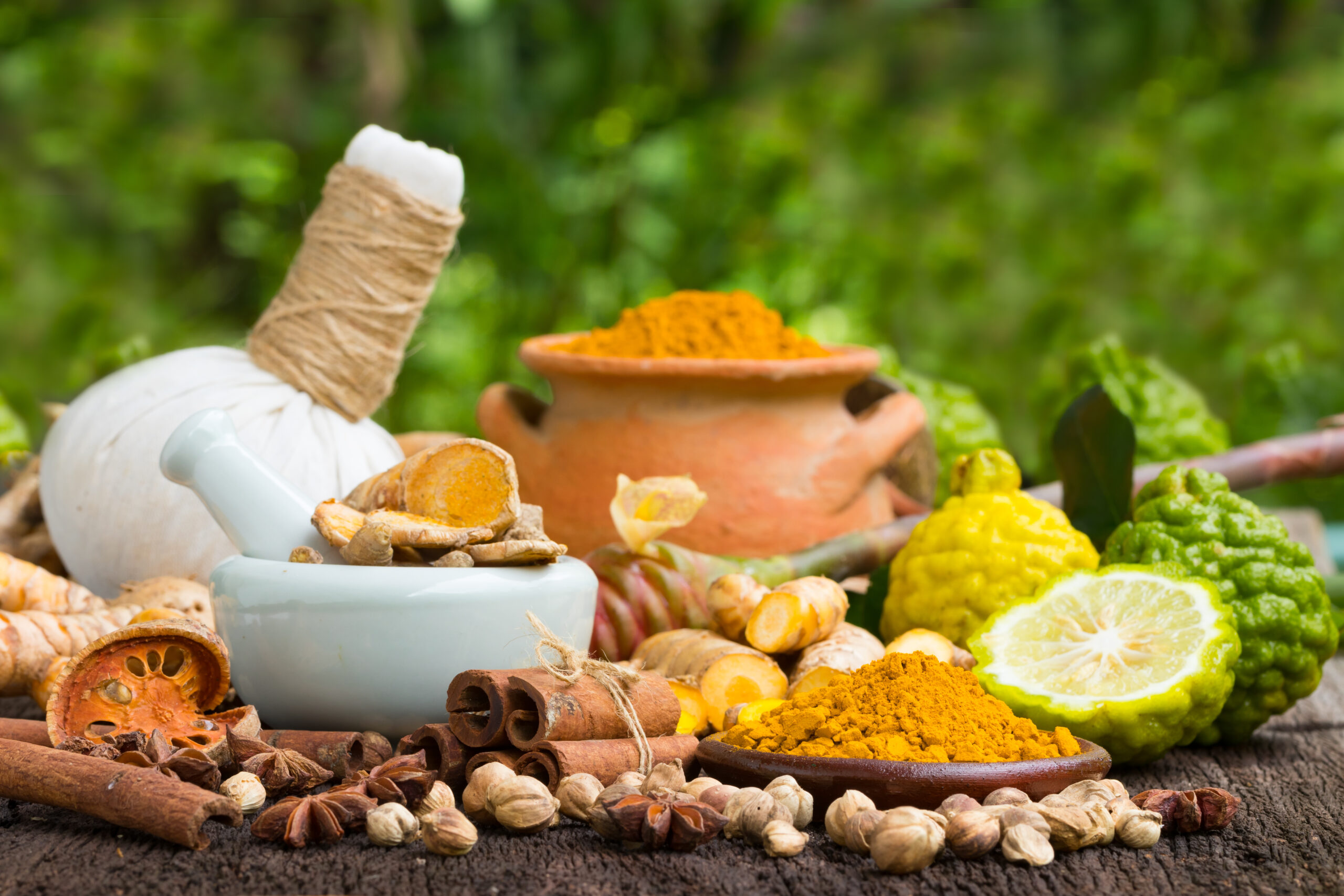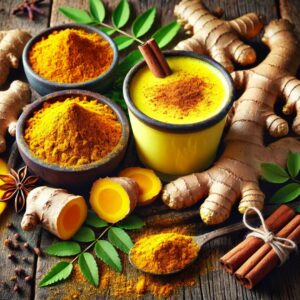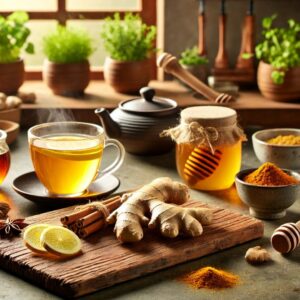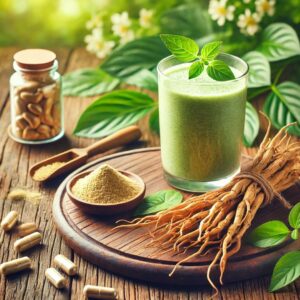

Ayurveda, an ancient system of medicine, focuses on maintaining balance in the body, mind, and spirit by aligning with the natural rhythms of the environment. It emphasizes living in harmony with nature and acknowledges how seasonal changes impact health. Modern Circadian science, recognized by Nobel prize-winning research, aligns with these principles, showing that the body’s internal clock is influenced by the seasons, and each season brings unique challenges. Ayurveda, rooted in Circadian medicine, offers natural strategies to stay healthy year-round.
In Ayurveda, seasonal transitions can disrupt your body’s balance. For example, in the fall, cooler and drier air can affect digestion, immunity, and mood. Adjusting your herbal remedies to align with the season is key to staying grounded and energized.
To help your body adapt to the cool, dry conditions of fall, Ayurveda recommends herbs that boost immunity, support digestion, and calm the mind. The top five herbs for fall are turmeric, ginger, ashwagandha, holy basil, and fenugreek. These Ayurvedic herbs offer potent health benefits, and we’ll explore how they’re ideal for the season and easy to incorporate into your daily routine.

Turmeric is a bright yellow root used for centuries in cooking and medicine. It has a slightly bitter, earthy flavor and is a key ingredient in many traditional dishes. But turmeric isn’t just for cooking; it’s also known for its amazing health benefits.
One of the best things about turmeric is that it can boost your immune system, which is especially important in the fall when colds are more common. It also has anti-inflammatory properties that can help reduce joint pain and swelling. Plus, turmeric supports digestion, helping your body function well as the weather cools down.
You can easily add turmeric to soups, curries, and even smoothies. Start with a small amount to enjoy its beautiful golden color and health benefits. Another popular way to enjoy turmeric is in turmeric lattes, or “golden milk,” which you can make by mixing it with warm milk, honey, and a pinch of black pepper to enhance absorption.
In Ayurveda, turmeric is loved for its ability to improve digestion and warm the body, making it ideal for fall. When paired with ginger, it creates a powerful combination that supports digestion and helps your body adapt to the changing seasons.
Turmeric also has deep cultural roots in Ayurveda and Indian traditions. It’s been used for thousands of years in cooking, skincare, and rituals. In Ayurvedic practices, turmeric is linked to purification and protection, symbolizing health and positivity.
Turmeric:
If you want to add turmeric to your meals in a flavorful way, try this one-pot turmeric rice with greens recipe. It’s a nutritious and easy dish that combines the health benefits of turmeric with hearty greens, perfect for fall.

Ginger is a warm and flavorful spice that many people enjoy. Its zesty taste can brighten up all sorts of dishes, and it’s been used for ages as a natural remedy.
When it comes to digestion, ginger stands out. It can help with bloating and discomfort, making it especially helpful if you’re feeling nauseous, whether from motion sickness or morning sickness. Plus, it’s great for your respiratory health, helping to clear congestion and soothe a sore throat.
One of the best things about fresh ginger is how versatile it is. You can toss it into stir-fries, soups, marinades, or dressings. Its warm flavor pairs well with both sweet and savory dishes, so feel free to get creative. Another enjoyable way to experience ginger is by making ginger tea. Just slice up some fresh ginger, steep it in hot water, and you’ll have a comforting drink. If you want to add some extra flavor, try mixing in a little honey or lemon.
In Ayurveda, ginger is highly regarded for its warming properties and ability to support digestion. When combined with turmeric, it helps your body digest food better and absorb nutrients, making them a fantastic pair, especially in the fall.
Ginger also has a rich history in traditional medicine, particularly in Ayurveda, where it’s celebrated for its healing benefits. You’ll often find it in herbal blends aimed at promoting overall health. In many cultures, ginger symbolizes warmth and comfort, which is why it’s such a cherished ingredient in kitchens around the world.
Ginger:
Caution for High Blood Pressure: Ginger has warming properties and can increase circulation, which may raise blood pressure. It is not recommended for individuals with high blood pressure.
Risk During Pregnancy: Ginger may pose risks during pregnancy and should be used cautiously or avoided.
Health Benefits: Supports digestion and reduces inflammation, but should be used with care depending on individual health conditions.
Another delightful way to enjoy ginger is in a warm cup of cardamom ginger chai. This flavorful chai not only supports digestion but also brings comfort during cooler months.

Ashwagandha, often called “Indian ginseng,” is a powerful herb known for its ability to help us handle stress. Its name translates to “smell of the horse,” which reflects its reputation for boosting energy and strength.
This remarkable herb is great for managing stress because it helps your body deal with anxiety and tension. It can also give you an energy boost, making it easier to stay active throughout the day. Plus, ashwagandha can improve your focus and help you think more clearly when things get hectic.
You can find ashwagandha in both powder and capsule forms. The powder is especially versatile; you can easily mix it into smoothies, oatmeal, or warm milk for a comforting drink. It is a nice addition to your morning routine or a soothing beverage to enjoy in the evening.
In Ayurveda, ashwagandha is highly valued for its ability to manage stress and enhance energy levels. It plays a key role in keeping both the body and mind balanced, making it a popular choice for those looking to improve their overall health.
With a long history in Ayurvedic medicine, ashwagandha is often mentioned in ancient texts as a rejuvenating herb. For thousands of years, it has been used to support health and longevity, highlighting its importance in traditional practices. People appreciate ashwagandha not only for its physical benefits but also for its ability to help build mental resilience and foster overall harmony in life.
Ashwagandha:
Heating Nature: While ashwagandha is a powerful adaptogen, it has a heating effect. It is not recommended for individuals prone to migraines, GERD, acidity, or experiencing hot flashes.
Health Benefits: Excellent for reducing stress and boosting energy, but should be avoided if you have conditions aggravated by heat
For a tasty and healthy way to include ashwagandha in your daily routine, try these chocolate ashwagandha protein bites. They are great for boosting energy and managing stress.

Holy Basil, or Tulsi, is an amazing plant known for its incredible health benefits in Ayurveda. With its fragrant leaves and rich history, Tulsi is more than just a plant; it represents health and spirituality.
This herb is fantastic for your breathing. It helps clear up congestion and soothes a sore throat. Plus, it’s great for reducing stress and helping you feel calm and relaxed. If you want to boost your immune system, especially during the colder months, Tulsi is a great ally.
Enjoying Tulsi is easy! You can make tea from its fresh or dried leaves by steeping them in hot water for a refreshing drink anytime. It also adds a delicious flavor to your cooking. just toss some into soups, stir-fries, or salads for a tasty and nutritious boost.
In Ayurveda, Holy Basil is known for promoting mental clarity and emotional balance. It helps bring your mind and body together, making it a key herb for your well-being, especially in the fall.
Tulsi is also deeply rooted in Indian culture and spirituality. Many people grow it in their homes and temples as a symbol of purity and devotion. It’s often used in spiritual practices and ceremonies, highlighting its sacred status. This strong connection to spirituality makes Tulsi a cherished herb in the everyday lives of many people.
Tulsi:
Caution for Those on Blood Thinners: Tulsi has natural blood-thinning properties and can interact with anticoagulant medications, so it should be avoided by individuals on blood thinners.
Health Benefits: A potent herb for reducing stress, promoting mental clarity, and enhancing immunity.

Fenugreek is a favorite herb for many people because of its unique taste and health benefits. You can use both the seeds and the leaves in your cooking, which makes it a common ingredient in kitchens all over the world.
One of the best things about fenugreek is how it helps with digestion. It can keep your stomach feeling good and ease any discomfort you might have. It’s also helpful for managing blood sugar levels, which is especially great for those living with diabetes. If you’re a nursing mom, fenugreek can even boost milk production, providing important nutrients for both you and your baby.
Adding fenugreek to your meals is super simple. You can mix the seeds into spice blends, curries, or pickles for a slightly bitter yet aromatic flavor. Fresh fenugreek leaves work wonderfully in salads, stews, or stir-fries, giving your dishes a nutritious kick. If you’re in the mood for a soothing drink, you can brew fenugreek seeds in hot water to make a tasty tea that aids digestion. Just soak the seeds in hot water, let them steep, and enjoy!
In Ayurveda, fenugreek is valued for its ability to balance different functions in the body. It’s believed to help harmonize the doshas, or energies, within you, supporting overall health, especially digestion and metabolism.
Fenugreek has a long history in cooking and medicine, especially in Indian and Middle Eastern cultures. For thousands of years, people have enjoyed it not just for its flavor but also for its many health benefits. This tradition shows how fenugreek connects nutrition and wellness in our lives.
Fenugreek:
Maple Syrup Odor: Fenugreek can cause a “maple syrup” smell in urine, which is harmless but notable.
Risk During Pregnancy: Fenugreek should not be used during pregnancy due to potential side effects.
Health Benefits: Supports digestion and helps regulate blood sugar, making it a valuable herb for fall but with specific precautions.
As the fall season arrives, it’s the perfect time to embrace the benefits of Ayurvedic herbs like turmeric, ginger, ashwagandha, holy basil, and fenugreek. Each of these herbs offers unique health advantages that support your well-being during this transitional time. From boosting immunity and aiding digestion to reducing stress and enhancing energy, these natural remedies can help you navigate the cooler months with ease.
Using these herbs in your daily routine is simple and rewarding. Whether you add turmeric to your favorite dishes, brew a comforting cup of ginger tea, or sprinkle fenugreek seeds into your cooking, these small changes can make a significant impact on your health. Embrace the wisdom of Ayurveda and make these powerful herbs a part of your journey to wellness this fall.
Ayurvedic herbs come from natural plants and are part of Ayurveda. These herbs are popular for their health benefits and can help improve your overall well-being.
Incorporating these herbs into your meals and drinks is easy! For instance, you can add turmeric to soups and curries, brew some ginger tea, or mix ashwagandha powder into your smoothies. Fresh or dried holy basil works well in salads, and fenugreek seeds can spice up your cooking.
Most Ayurvedic herbs are safe, but a few may cause side effects or interact with medications. It's always a good idea to check with your doctor before starting any new herbal routine, especially if you have health concerns or are pregnant.
Absolutely! These herbs can be especially helpful in the fall. They can support your immune system, improve digestion, and help reduce stress. Adding them to your daily routine can make it easier for your body to adapt to the changing seasons.
The right form of these Ayurvedic herbs depends on your personal preferences. If you love to cook, fresh herbs or powders might be your best bet. If you prefer convenience, capsules or ready-made teas could work better for you.
You can find Ayurvedic herbs at health food stores, specialty grocery stores, or even online. Just make sure to look for high-quality products to get the best benefits.
How long it takes to notice benefits can vary from person to person, depending on your health and lifestyle. If you use them consistently for a few weeks, you may start to feel some positive changes.
If you're on medication, it's important to talk to your doctor before using Ayurvedic herbs. Some of them might interact with your medications, which could change how they work or cause side effects.
Definitely! There are plenty of delicious recipes featuring these herbs. Try a turmeric and ginger smoothie, a lentil stew with fenugreek, or a soothing holy basil tea. These dishes not only highlight the herbs but also add fantastic flavor and nutrition to your meals.
Yes! Many of these Ayurvedic herbs are easy to grow right at home. You can plant turmeric and ginger in pots, and holy basil loves sunny spots. Growing your herbs gives you fresh, organic options whenever you need them and adds a personal touch to your cooking!

The Holistic HIghway integrates traditional Western medical practices with Ayurveda medicine, creating a focus on prevention through nutrition, diet, and exercise; use of the latest genetic testing and other diagnostic techniques; and prescribed combinations of botanical medicines, supplements, therapeutic diets, detoxification programs, or stress-management techniques.

Integrative Health Expert | Ayurveda Practitioner | Author | Speaker
Kerry is a globally recognized leader in integrative medicine and the science of health known as Ayurveda. She is passionate about raising awareness of the need for a change in contemporary medicine that focuses on patient empowerment and a health-based (rather than disease-based) medical system.
Kerry is connected with The University of Pittsburgh Center for Integrative Medicine and remains a pioneer in the field of integrative medicine where she has developed a personalized system to manage chronic disorders by incorporating fundamental changes in diet, behavior, and stress while focusing on genetics.
This individualized program is so successful that many of her clients have achieved maximum healing and vitality after years of chronic problems!
More to Explore
Contact
Disclaimer
The sole purpose of all the website content is to educate and provide information about Integrative Health, Genetics and Ayurveda.This information is not intended for use in the diagnosis, treatment, cure. or prevention of any disease.
Stay Connected